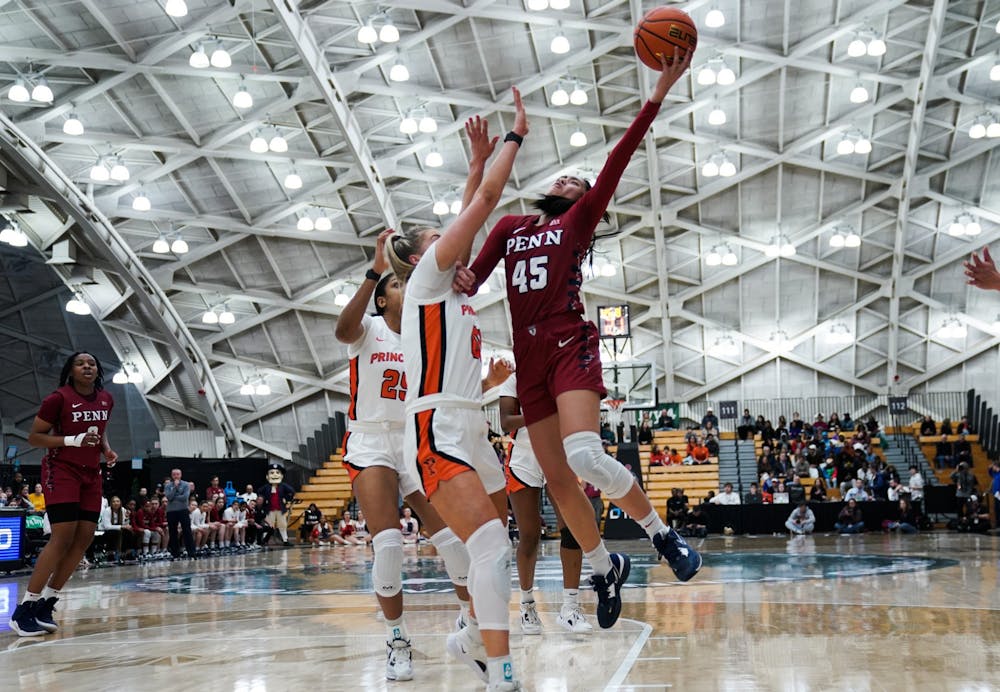Following a loss to its rival in Princeton to end its Ivy League Tournament Championship hopes, Penn women’s basketball headed south to Virginia for the first round of the Women's National Invitation Tournament. But what greeted them once they arrived in Richmond was a strong Spiders squad which decimated the Quakers for all 40 minutes of a 75-52 win.
For Penn, its season is now officially over, with a final record of 17-12, and 9-5 against Ivy League foes. Richmond is now 21-10 (8-6 Atlantic 10), and will face either Rhode Island or Boston University in the second round of the tournament.
“That wasn’t the outcome we had hoped for, but Richmond played really well tonight,” coach Mike McLaughlin said. “Hats off to them for performing well tonight, they are a tough team and well coached.”
Thursday’s game will also be the last time five seniors — guards Kayla Padilla, Mandy McGurk, and Sydnei Caldwell, forward Silke Milliman, and center Faye Parker — will don the Red and Blue.
“I couldn’t be more proud of all five of [the seniors], stepping up into leadership roles this season and really helping us improve in a big way from last season,” McLaughlin said.
Before the game, McLaughlin said that Richmond’s multifaceted offensive attack would challenge Penn in ways that the team hadn’t seen in many games. And from nearly the opening jump, his prediction proved correct, as the Spiders scored 11 quick points before McLaughlin called a timeout in the first quarter.
One thing that particularly seemed to be troubling Penn was Richmond’s five-out strategy, which helped them go 5-8 from long range in the first quarter. This tactic particularly picked on Penn’s bigs, and McLaughlin alternated between Parker and junior forward Floor Toonders in an attempt to find an answer.
But what McLaughlin didn’t account for was the Quakers’ sluggish offensive performance. Similar to last week’s game, the Quakers were slow to wake up in the first quarter — not scoring until there was 5:19 left in the first quarter, when they were already down by double digits.
But unlike against Princeton, these struggles on the offensive end continued throughout the first half. In the second quarter, Penn had a stretch of nearly five minutes without a single made field goal. By halftime, the Quakers had only scored 24 points, 12 of which came from Padilla. Outside of her, the offense was downright anemic, going 4-24 from the field.
Richmond, on the other hand, kept on chugging. The Spiders cooled down from three in the second quarter, but went 7-9 from the free throw line during the period, giving them 40 points before halftime.
Throughout the first half, one key difference between the two teams was turnovers. While Richmond only turned the ball over once — and Penn couldn’t turn that chance into any points — the Quakers had eight turnovers before the break, leading to 10 points on the other end.
Down by 16 going into halftime, Penn’s problems continued in the third quarter. The offense simply could not keep up with Richmond, with the Quakers going 1-8 from long range in the period. Richmond didn’t help the situation, either, continuing to pile on the points and getting the lead as high as 29.
Even though Penn narrowed the gap to 21 headed into the fourth quarter, and McLaughlin left his starters in for most of the period, the contest was largely over by the time there were 10 minutes left to play. And once the quarter began, Penn didn’t make any progress on the lead either. Instead, Richmond built it back up to 29 with six minutes left to play. While the Quakers would ultimately nab a few more buckets to lose by a slightly more respectable 23, the result was never in question.
Despite the blowout on the scoreboard, several statistical categories were still close, with Penn recording only two fewer offensive rebounds and steals, and even notching more blocks and bench points. But in a game where winning depends on scoring, the Quakers simply couldn’t keep up with a Richmond offense that scored nearly 10 more points than Penn typically allowed during the regular season.
Postgame, McLaughlin preferred not to focus on the score, and instead provided perspective on the program as a whole, saying that “although we close the door on this season, I feel like we have taken another big step forward in the program and are excited to get to work for next year.”









